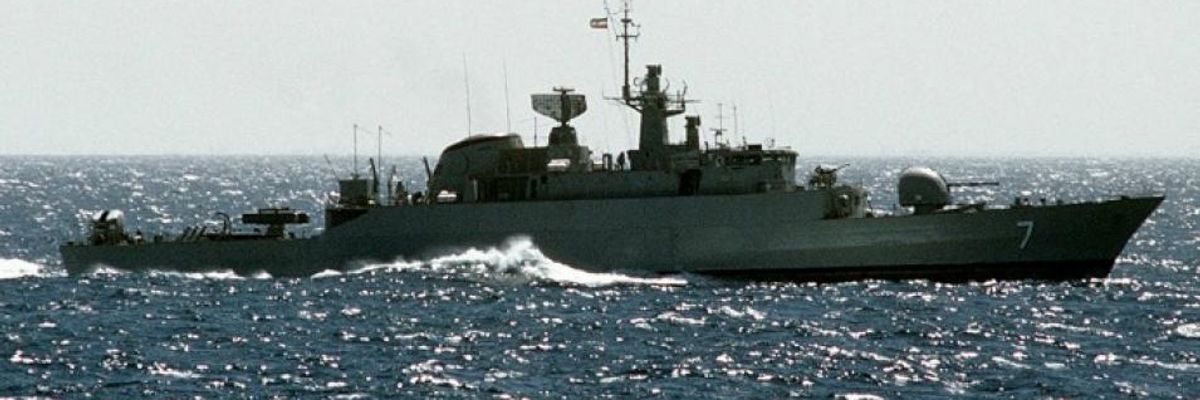

SUBSCRIBE TO OUR FREE NEWSLETTER
Daily news & progressive opinion—funded by the people, not the corporations—delivered straight to your inbox.
5
#000000
#FFFFFF
To donate by check, phone, or other method, see our More Ways to Give page.


Daily news & progressive opinion—funded by the people, not the corporations—delivered straight to your inbox.

Iran's Alvand warship, one of two reportedly deployed on Thursday. (Photo: ThereAreNoSunglasses.wordpress.com)
Iran reportedly sent two warships to the Gulf of Aden on Thursday, following news of the first-ever U.S. cruise missile strikes on Iran-backed Houthis late Wednesday.
The republic's naval commander confirmed that two naval destroyers had been deployed off the Yemeni coast "to protect trade vessels," as the semi-official Tasnim news agency reported.
RT reports that the commander, Rear Admiral Habibollah Sayyari, "dismissed claims the fleet has been deployed to intervene in the conflict in Yemen."
But given that "[m]any see the Yemen conflict as a proxy war between the Middle East's two main rivals, Saudi Arabia and Iran, and their western or regional backers," as the Guardian put it on Thursday, the latest development could further ratchet up tensions in the region.
Indeed, Stephen Seche, who served as the U.S. ambassador to Yemen from 2007 to 2010, told the newspaper in response to the U.S. escalation: "It's not at all a stretch of the imagination, to my mind, that the Iranians benefit from seeing the U.S. drawn into this."
But Peter Cook, the Pentagon press secretary, on Thursday said that despite the missile attacks on Yemen, the U.S. military is not interested in expanding its involvement in the war.
"We don't seek a wider role in this conflict," Cook said, claiming the strikes were a limited reprisal to defend the USS Mason and freedom of navigation in the Bab al-Mandeb waterway, "not connected to the broader conflict in Yemen."
Political revenge. Mass deportations. Project 2025. Unfathomable corruption. Attacks on Social Security, Medicare, and Medicaid. Pardons for insurrectionists. An all-out assault on democracy. Republicans in Congress are scrambling to give Trump broad new powers to strip the tax-exempt status of any nonprofit he doesn’t like by declaring it a “terrorist-supporting organization.” Trump has already begun filing lawsuits against news outlets that criticize him. At Common Dreams, we won’t back down, but we must get ready for whatever Trump and his thugs throw at us. Our Year-End campaign is our most important fundraiser of the year. As a people-powered nonprofit news outlet, we cover issues the corporate media never will, but we can only continue with our readers’ support. By donating today, please help us fight the dangers of a second Trump presidency. |
Iran reportedly sent two warships to the Gulf of Aden on Thursday, following news of the first-ever U.S. cruise missile strikes on Iran-backed Houthis late Wednesday.
The republic's naval commander confirmed that two naval destroyers had been deployed off the Yemeni coast "to protect trade vessels," as the semi-official Tasnim news agency reported.
RT reports that the commander, Rear Admiral Habibollah Sayyari, "dismissed claims the fleet has been deployed to intervene in the conflict in Yemen."
But given that "[m]any see the Yemen conflict as a proxy war between the Middle East's two main rivals, Saudi Arabia and Iran, and their western or regional backers," as the Guardian put it on Thursday, the latest development could further ratchet up tensions in the region.
Indeed, Stephen Seche, who served as the U.S. ambassador to Yemen from 2007 to 2010, told the newspaper in response to the U.S. escalation: "It's not at all a stretch of the imagination, to my mind, that the Iranians benefit from seeing the U.S. drawn into this."
But Peter Cook, the Pentagon press secretary, on Thursday said that despite the missile attacks on Yemen, the U.S. military is not interested in expanding its involvement in the war.
"We don't seek a wider role in this conflict," Cook said, claiming the strikes were a limited reprisal to defend the USS Mason and freedom of navigation in the Bab al-Mandeb waterway, "not connected to the broader conflict in Yemen."
Iran reportedly sent two warships to the Gulf of Aden on Thursday, following news of the first-ever U.S. cruise missile strikes on Iran-backed Houthis late Wednesday.
The republic's naval commander confirmed that two naval destroyers had been deployed off the Yemeni coast "to protect trade vessels," as the semi-official Tasnim news agency reported.
RT reports that the commander, Rear Admiral Habibollah Sayyari, "dismissed claims the fleet has been deployed to intervene in the conflict in Yemen."
But given that "[m]any see the Yemen conflict as a proxy war between the Middle East's two main rivals, Saudi Arabia and Iran, and their western or regional backers," as the Guardian put it on Thursday, the latest development could further ratchet up tensions in the region.
Indeed, Stephen Seche, who served as the U.S. ambassador to Yemen from 2007 to 2010, told the newspaper in response to the U.S. escalation: "It's not at all a stretch of the imagination, to my mind, that the Iranians benefit from seeing the U.S. drawn into this."
But Peter Cook, the Pentagon press secretary, on Thursday said that despite the missile attacks on Yemen, the U.S. military is not interested in expanding its involvement in the war.
"We don't seek a wider role in this conflict," Cook said, claiming the strikes were a limited reprisal to defend the USS Mason and freedom of navigation in the Bab al-Mandeb waterway, "not connected to the broader conflict in Yemen."